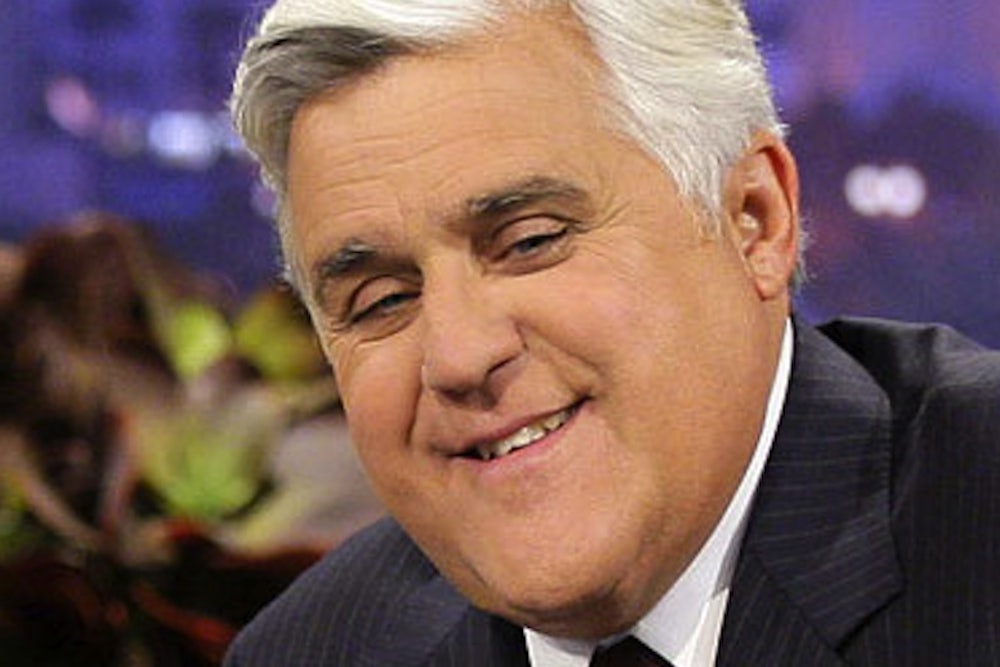It’s hard to get too worked up about Jay Leno’s last episode of the “Tonight Show,” which will feature '90s celebrities Billy Crystal and Garth Brooks. (I'd mock the choice of guests, but the only thing more hackneyed than a joke by Jay Leno is a joke about Jay Leno.) For one thing, we’ve been through this before, and it ended with Leno back in the same chair within months. In this second farewell tour—nothing like the last one!—Leno still seems ungracious about making way for Jimmy Fallon: "I think I probably would have stayed if we didn't have an extremely qualified, young guy ready to jump in,” he told "60 Minutes" last month. “It was not my decision.” Still, Leno has offered his successor one piece of advice: “Make your monologue longer.”
Sorry, Jimmy, but that’s terrible advice. (So terrible that it might even be a subtle attempt at sabotage on Leno’s part?) The opening monologue has been a part of “Tonight Show” tradition since Steve Allen first hosted in 1954. But when Fallon takes the throne on February 17, after the Olympic Closing ceremonies, his first step should be to reboot the format and kill the monologue entirely.
“To me, the monologue is the most important part of ‘The Tonight Show,’” Leno told The Washington Post in 1991, not long after he’d beaten out Dave Letterman for the gig. While Letterman’s monologues were ironic and casual, Leno’s were newsy and topical, mining the day’s headlines for a succession of one-liners. In the last two decades, Jay Leno has told 4,607 jokes about Bill Clinton. He’s told 795 about O.J. Simpson and 673 about Dick Cheney. (We have the good people at the Center for Politics and Media to thank for these stats.) Before taking his spot as national punchline, Leno was once the hardest-working stand-up comic on the road, and for him, the joke is the fundamental unit of comedy: “Write joke, tell joke, get check,” is how he once summarized the job.
But the job has changed. As my colleague Laura Bennett wrote last year, late-night comedy success is now partially measured in potential virality, nuggets of video designed to be emailed and shared the next morning. This is exactly where Fallon has thrived: Justin Timberlake's history of rap, President Obama slow-jamming the news, Bruce Springsteen mocking Governor Christie in song. Even without celebrity guests, Fallon’s nostalgic, earnest, pop culture-obsessed energy is tailor-made for today’s Buzzfeed-ruled internet. Like Seth Meyers, a fellow Saturday Night Live alumnus, he was trained in improv, not stand-up comedy, and his best bits are as likely to spread a smile across your face as make you guffaw. See last Wednesday’s cold open, featuring a perfect recreation of the “Full House” set and reuniting Bob Saget, John Stamos, and Dave Coulier:
But in today’s media-saturated landscape, the classic opening monologue feels extraneous. In Leno’s hands, the monologue was essentially a series of one-liners about unavoidable news headlines—which is not all that dissimilar to my Twitter feed, during most breaking news events. “People are busy, work hard, they may have missed the news, so you have to give them a complete view of the news,” Leno reportedly told Fallon. That may work for Jon Stewart and Stephen Colbert, whose satiric points of view contextualize the headlines. But the classic late-night monologue is just a series of one-liners, and by 11:35, I’ve spent the entire day watching people crack wise about Justin Bieber in 140 characters.
Unfortunately, the ever eager-to-please Fallon has already begun to follow Leno’s counsel: His monologues have leapt from three to eight, sometimes ten interminable minutes. (A sample joke from last week: “Yesterday, House Republicans unveiled the new plan that would allow undocumented immigrants to become citizens if they learned about American history—which would be great, because then they could teach it to Americans.”) Fallon may worry about breaking with tradition, and he may fear alienating the millions of viewers who have given Leno’s “Tonight Show” the biggest audience in late night. He has good reason to be diplomatic, but after tonight, Leno is off the air and Fallon has his own legacy to consider. And every minute he spends standing in front of a curtain telling topical jokes is another minute no one will watch on Youtube the next day.
